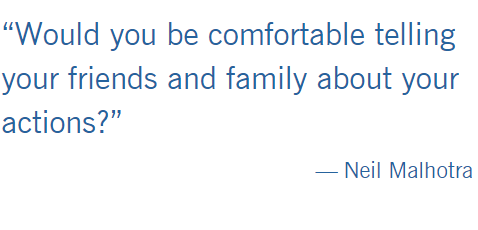Understanding your core values and how to incorporate them into your business can improve company culture and accountability.
Ethics and values are as much a part of your business as your product, operations, or customers. Stakeholders want to know where you stand on any number of issues, and employees deserve a workplace where they feel safe and respected. So how can you incorporate your ethics into your business? And how do you stay true to them, especially while leading others whose values may be different?
Two Stanford Graduate School of Business faculty members who also teach in Executive Education programs addressed these often challenging issues in a recent book. Ken Shotts, the David S. and Ann M. Barlow Professor of Political Economy, and Neil Malhotra, the Edith M. Cornell Professor of Political Economy, are the authors of “Leading With Values: Strategies for Making Ethical Decisions in Business and Life.” See their tips for testing your ethics to become a more effective leader — and some best practices for making your workplace reflective of your values — below.
Establish Your Core Values
Are you clear about what your ethical standards are? Core values are shaped by an individual’s cultural and religious traditions, personal history, experiences, and expectations. Take time to consider the standards and ethics that are important to you, such as integrity, diligence, compassion, or accountability. Then, give team members time to reflect on theirs as well.
“Importantly,” says Shotts, “don’t assume that everyone in your organization shares your own values.” More likely, there’s a mix of people whose values do and don’t align with yours. Your job isn’t to try to change their values, it’s to foster an environment that allows for differences of opinion, where people feel safe to express themselves and to civilly disagree with others.
Determine If You’re Acting Ethically
There are various methods to help you determine if your behavior is ethical. One of the most common is The New York Times Test, which asks if you would act the same way if you knew the paper of record was reporting on it. But it’s unlikely that your day-to-day activities and decisions are that newsworthy, making this an abstract and ineffective guardrail to keep you on a path that aligns with your ethics.

Malhotra suggests a better way: “Would you be comfortable telling your friends and family about your actions and decisions? Or are you withholding information because it’s inconsistent with your value structure?” The Friends and Family Test is an effective reminder of where your ethical boundaries lie. Establishing a trusted network of people who will give you honest feedback and hold you accountable makes this test even more helpful.
Handling Ethically Challenging Situations
Be proactive. If you plan ahead for situations you may encounter in your business — and think through how you’ll act if they occur — you’re more likely to stick to your values than if you’re reacting spontaneously to circumstances for which you’re not prepared.
If you do find yourself in a situation that doesn’t align with your ethics, Shotts says the best thing you can do is to temporarily remove yourself, both physically and emotionally. That gives you a chance to consider your options and realign yourself with your values before taking action.
Put Ethics to Work
Here are some best practices for making values an integral part of your company:
- Provide time and space for team members, including leaders, to reflect on and write down their values.
- Cultivate an environment of encouragement and respect so that team members feel comfortable sharing their opinions and disagreeing with others.
- Remember the Friends and Family Test. Encourage employees to build networks of colleagues who will help them stay aligned with their values.
- Ask your team to think about the types of situations they might encounter at work and how they plan to react. Role-playing potential scenarios with co-workers may help them prepare for unexpected situations.
- Let employees know that if they find themselves in an unethical situation, physically and emotionally distancing themselves temporarily will help them reestablish their ethical boundaries.
As a leader, it’s important to understand and stay true to your own values. But it’s equally important to understand that every employee has their own values shaped by their unique experiences. Fostering an environment of respect and empathy for these differences, while communicating your own values clearly, allows for greater collaboration and a more productive team.
___
This article first appeared in gsb.stanford.edu
Seeking to build and grow your brand using the force of consumer insight, strategic foresight, creative disruption and technology prowess? Talk to us at +971 50 6254340 or engage@groupisd.com or visit www.groupisd.com/story




